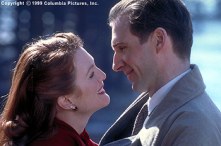| The End of the Affair |
| |
 |
U.K./USA, 1999. Rated R. 109 minutes.
Cast:
Ralph Fiennes, Julianne Moore, Stephen Rea, Ian Hart, Jason Isaacs, Sam
Bould, Heather Jay-Jones, James Bolam
Writers: Neil Jordan based on the novel by Graham Greene
Music: Michael Nyman
Cinematographer: Roger Pratt
Producers: Stephen Woolley and Neil Jordan
Director: Neil Jordan
LINKS
|
 f
you’re trying to decide whether to see Deuce Bigalow: Male Gigolo or
The End of the Affair this weekend, go see the former. That’s right.
You wouldn’t like Neil Jordan’s latest offering. It’s too dour. If there are
any fart jokes, they’re buried in the religious subtext. Besides, who wants
to see a self-destructive writer’s tortured ruminations on his abruptly interrupted
tryst with some pale English woman? If that were all to The End of the Affair,
if it were merely an excursion through the doldrums, then perhaps it would be
excusable to prefer Rob Schneider’s epic farce of mistaken identity. Alas, it
is with little regret, that I must report The End of the Affair is another
surprising entry into 1999’s long list of choice films.
f
you’re trying to decide whether to see Deuce Bigalow: Male Gigolo or
The End of the Affair this weekend, go see the former. That’s right.
You wouldn’t like Neil Jordan’s latest offering. It’s too dour. If there are
any fart jokes, they’re buried in the religious subtext. Besides, who wants
to see a self-destructive writer’s tortured ruminations on his abruptly interrupted
tryst with some pale English woman? If that were all to The End of the Affair,
if it were merely an excursion through the doldrums, then perhaps it would be
excusable to prefer Rob Schneider’s epic farce of mistaken identity. Alas, it
is with little regret, that I must report The End of the Affair is another
surprising entry into 1999’s long list of choice films.
The End of the Affair is based on Graham Greene’s autobiographical novel
written in 1951. It was made into a film in 1955 starring Deborah Kerr and Van
Johnson. The story is rather complex for such a small cast (only six notable
characters). It begins on a cold rainy night in London. The year is 1946, and
writer Maurice Bendrix (Ralph Fiennes), runs into an old friend, Henry Miles
(Stephen Rea…. what’s he doing in a Neil Jordan film?) whom he hasn’t
seen in a couple of years. Henry is glum. He suspects his wife Sarah (Julianne
Moore) is having an affair.  The
news piques Bendrix’s curiosity – he had a lengthy affair with Sarah during
the war himself. They retire to Henry’s living quarters, where Henry tells Bendrix
he’s considered hiring a private investigator but would feel foolish doing so.
Bendrix offers to play the role of jealous lover and solicit the investigator
himself. Though Henry doesn’t know it, Bendrix really is a jealous lover; he’s
never let Sarah out of his heart or mind for two years.
The
news piques Bendrix’s curiosity – he had a lengthy affair with Sarah during
the war himself. They retire to Henry’s living quarters, where Henry tells Bendrix
he’s considered hiring a private investigator but would feel foolish doing so.
Bendrix offers to play the role of jealous lover and solicit the investigator
himself. Though Henry doesn’t know it, Bendrix really is a jealous lover; he’s
never let Sarah out of his heart or mind for two years.
This first scene establishes the mood that permeates the entire film. A less
appreciative critic of the movie might call it “lugubrious.” The rain outside
is unrelenting, as if God is punishing those below. The lighting is wan and
cinematographer Roger Pratt gives the environment a void and anemic feel. The
atmosphere represents the internal Sturm und Drang of the bewildered,
hateful Bendrix. It makes for a depressing viewing experience that carries through
the first half of the film. Though it’s gloomy, the style is far from being
cold and distant. It’s a swoon-inducing gloom, reinforced by Michael Nyman’s
elegiac score. One could fall in love with the sadness of this picture.
While Bendrix and Miles discuss Sarah’s possible adultery, she arrives home.
It is the first time in two years that Bendrix has seen Sarah and his mind quickly
flashes to snippets of a lurid sexual encounter they once had in the very location
she is occupying. Her arrival is Bendrix’s cue to excuse himself, and he does
so with only a brusque acknowledgement of Sarah’s presence. Seeing Sarah once
again torments Bendrix. He enlists the services of a private investigator named
Parkis (Ian Hart), who tails Sarah with his son Lance (Sam Bould) in tow. We
learn soon enough that these scenes are not set in the present, as the film
jumps forward to Bendrix sitting at a typewriter punching out his “diary of
hate.”  There
is something in Bendrix that eats at him more than jealousy or betrayal. We
get the sense his whole existence has been turned upside down. Like The English
Patient, Ralph Fiennes is once again the center of a mystery to which frequent
flashbacks begin to give us clues.
There
is something in Bendrix that eats at him more than jealousy or betrayal. We
get the sense his whole existence has been turned upside down. Like The English
Patient, Ralph Fiennes is once again the center of a mystery to which frequent
flashbacks begin to give us clues.
We are taken back to the beginning of the affair. During the war, Bendrix and
Sarah meet at one of her husband’s parties. The attraction is instant, and the
first moment they are alone together Bendrix tells her he loves her. So begins
a torrid romance. Sarah is a free spirit shackled by a boring husband. Bendrix
worships her in an odd way – he measures his love for her by his jealousy of
her husband, her stockings, and even her shoes. There are several beautifully
shot scenes of lovemaking, often occurring during the height of the Blitz, as
bombs drop around them. These scenes may produce some inadvertent laughter.
It is ridiculous, the melodramatic co-existence of war and passion. I thought
the tone was struck just right though; this felt like an old Hollywood romance,
just with a gracious dose of nudity. It is after one of these bouts of ardor
however, that everything changes for Bendrix and Sarah.
[Note: At this point, I’d like to go into detail about the next several
scenes that might constitute SPOILERS for some people. If you’d like
to be as uninformed and surprised as I was going into the film, skip ahead to
the section that says “end spoilers.”]
Bendrix and Sarah are in the throes of passion when Bendrix hears a noise downstairs.
Thinking it’s a prowler, he goes out into the hall to investigate. At that moment
a bomb hits the building, sending Bendrix through the floor to the main level
of the building. It’s an amazing shot that culminates in a silent darkness amidst
the debris. It seems impossible that Bendrix could have survived. After a pause,
he does rise, and proceeds slowly up the stairs to check on Sarah. Her back
is turned to him; evidently she is praying. When he touches her, she is stunned
that he lives, but her affection is curiously held in check. Here is where Julianne
Moore’s remarkable performance shines – in her eyes we see a tremendous struggle
as she willfully denies herself to stay with Bendrix. Instead, she asks if he’s
all right and then dresses and leaves. Just like that, the affair is ended.
Bendrix is understandably confused, hurt, and upset.
The End of the Affair could more accurately be titled “The End of the
Affairs” as it delves into not only the fervent first fling during the war,
but also a present-tense attempt to pick up the pieces. The rejoining of the
two occurs after Bendrix learns Sarah’s side of their story through her diary,
which the Parkis duo helpfully swipe. We see a replay of the tumultuous bomb
scene through her eyes, and suddenly the intent of the story reveals itself.
When Bendrix fell to the ground floor, Sarah went to investigate. Bendrix appeared
to be dead, and in a moment of desperate grief Sarah prayed to God to bring
him back. She begged forgiveness for her adultery and promised to leave him
if only he were alive. When Bendrix indeed does rise and confront her praying
in her room, she knows she has witnessed a miracle.
AboutFilm.Com
The Big Picture
|
| Alison |
-
|
| Carlo |
A
|
| Dana |
A-
|
| Jeff |
B+
|
| Kris |
A-
|
| ratings explained |
We often make impassioned pleas to the almighty in hours of desperation. In
that heated moment, we believe, whether we are believers all the time or not.
Similarly, in the heat of passion we often blurt out feelings that in retrospect
never should have been uttered. What if, The End of the Affair contends,
we had to live by those choices? In this story, Sarah tells Bendrix that just
because she can no longer see him, her love remains. Their love, she says, is
tangible and real. In a Catholic sense, this parallels a relationship with God,
who cannot be seen, but whose love is manifested in everyday life. Bendrix,
who doesn’t believe in God, is nonplussed. His bafflement turns to anger over
time, especially when he suspects she has taken up with another man, a priest
(Jason Isaacs) no less. His anger reaches its peak when he and Sarah resume
their relationship, for now there appears to be hope. She will divorce Henry
(for his part, Henry is sad but acquiescent) and they can start a family. But
God appears to be punishing them for their sins. God makes his presence known
in the final act, through ending one life and performing a miracle in another.
[END SPOILERS]
The tight script ties each character inextricably to the proceedings. The investigative
duo of the Parkis’ turn out to be more-than-welcome comic relief. Henry Miles
and Father Smythe both have scenes that express their feelings for Sarah poignantly.
Though sluggish at first, the movie grew on me and by then I was nearly agape
at the implications. Neil Jordan has crafted a fine heady romance that dares
to explore the different aspects of faith: fidelity to oneself, to your spouse,
your love, and to your god. The performances are uniformly excellent. Who is
better at playing the self-hating emotionally repressed intellectual than Ralph
Fiennes? He smolders and pines exquisitely, playing riffs from his Laszlo Almasy
persona in The English Patient. Stephen Rea gives his best performance
since The Crying Game, his cold fish exterior belies a bittersweet ruefulness.
Best of all is the continually impressive Julianne Moore. Hers is a difficult
role, for she must convince us that she is worthy not only of the attentions
of every man and boy in this film, but of God as well. And she does, swimmingly!
Not only has she never been so alluring, but she is heartbreaking as well. How
else could she pull off the same line Kristen Scott Thomas gives to Fiennes
in The English Patient – “I have always loved you….” Amazingly, it has
nearly an equal emotional impact. Take it on faith that Deuce Bigalow
lacks this punch.
Review
© December 1999 by AboutFilm.Com and the author.
Images © 1999 Sony Pictures Classics. All rights reserved.

 The
news piques Bendrix’s curiosity – he had a lengthy affair with Sarah during
the war himself. They retire to Henry’s living quarters, where Henry tells Bendrix
he’s considered hiring a private investigator but would feel foolish doing so.
Bendrix offers to play the role of jealous lover and solicit the investigator
himself. Though Henry doesn’t know it, Bendrix really is a jealous lover; he’s
never let Sarah out of his heart or mind for two years.
The
news piques Bendrix’s curiosity – he had a lengthy affair with Sarah during
the war himself. They retire to Henry’s living quarters, where Henry tells Bendrix
he’s considered hiring a private investigator but would feel foolish doing so.
Bendrix offers to play the role of jealous lover and solicit the investigator
himself. Though Henry doesn’t know it, Bendrix really is a jealous lover; he’s
never let Sarah out of his heart or mind for two years.
 There
is something in Bendrix that eats at him more than jealousy or betrayal. We
get the sense his whole existence has been turned upside down. Like The English
Patient, Ralph Fiennes is once again the center of a mystery to which frequent
flashbacks begin to give us clues.
There
is something in Bendrix that eats at him more than jealousy or betrayal. We
get the sense his whole existence has been turned upside down. Like The English
Patient, Ralph Fiennes is once again the center of a mystery to which frequent
flashbacks begin to give us clues.
